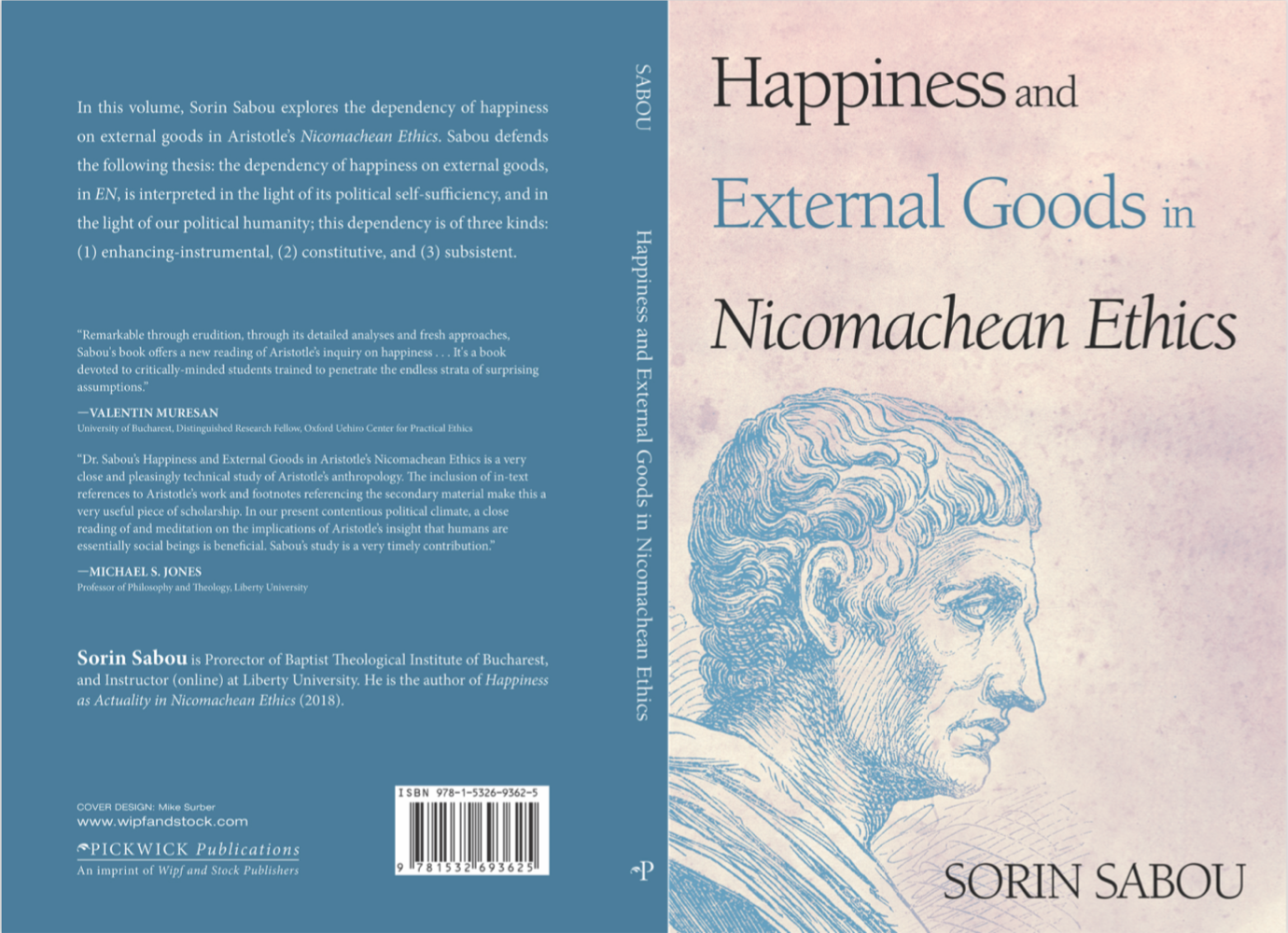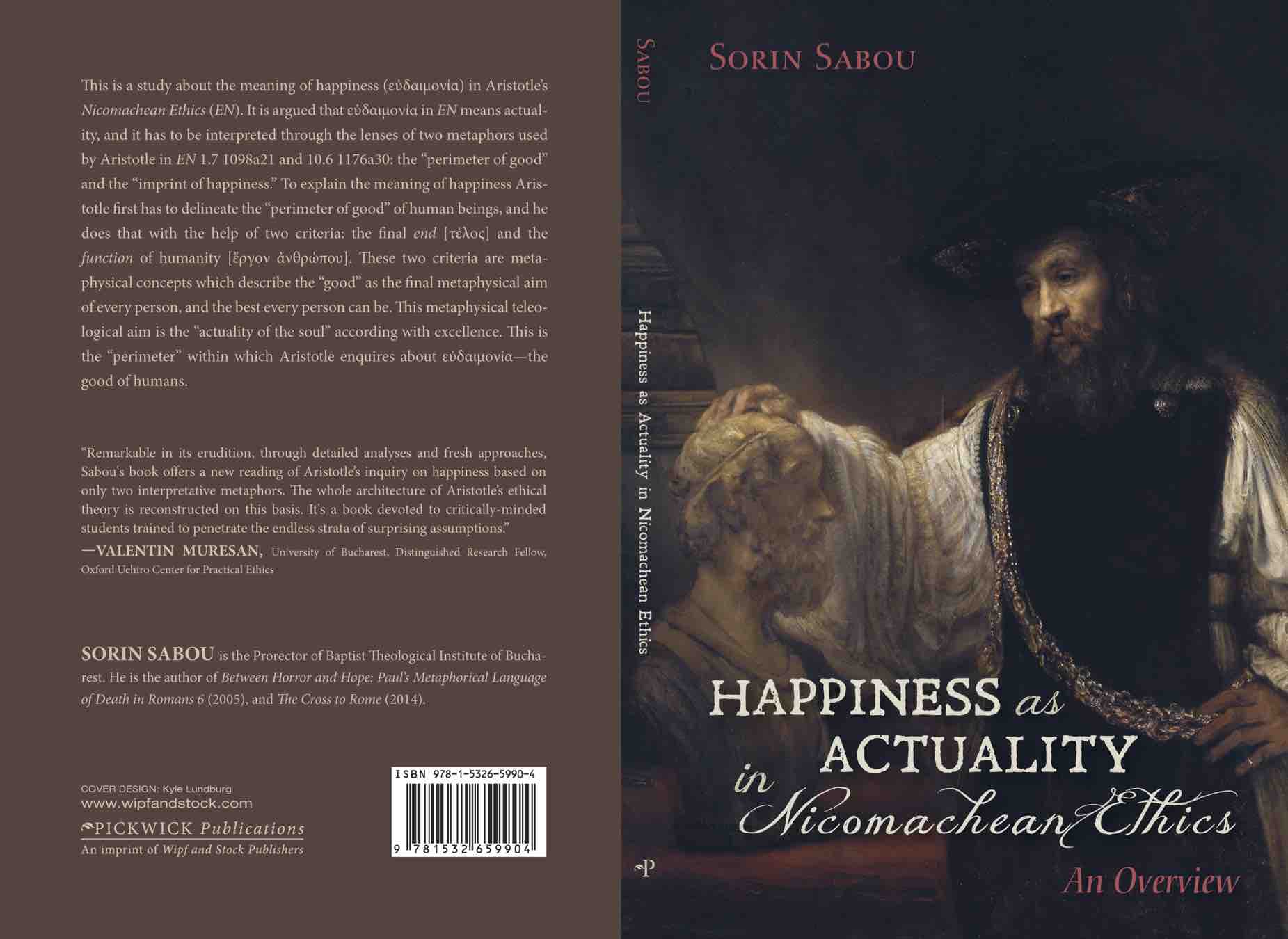Happiness and External Goods in Nicomachean Ethics
31/12/19 11:56 Filed in: Ethics | Philosophy
Sabou, Sorin, Happiness and External Goods in Nicomachean Ethics (Pickwick Publications, 2019).
In this volume, Sorin Sabou explores the dependency of happiness on external goods in Aristotle’s Nicomachean Ethics. Sabou defends the following thesis: the dependency of happiness on external goods, in EN, is interpreted in the light of its political self-sufficiency, and in the light of our political humanity; this dependency is of three kinds: (1) enhancing-instrumental, (2) constitutive, and (3) subsistent.

In this volume, Sorin Sabou explores the dependency of happiness on external goods in Aristotle’s Nicomachean Ethics. Sabou defends the following thesis: the dependency of happiness on external goods, in EN, is interpreted in the light of its political self-sufficiency, and in the light of our political humanity; this dependency is of three kinds: (1) enhancing-instrumental, (2) constitutive, and (3) subsistent.

Comments
Happiness as Actuality in Nicomachean Ethics, An Overview
12/10/18 15:52 Filed in: Philosophy | Ethics
Sabou, Sorin. Happiness as Actuality in Nicomachean Ethics, An Overview (Pickwick Publications, 2018).
This is a study about the meaning of happiness [εὐδαιμονία] in Aristotle’s Nicomachean Ethics (EN). This study argues that εὐδαιμονία in EN means actuality, and it has to be interpreted through the lenses of two metaphors used by Aristotle in EN 1.7 1098a21 and 10.6 1176a30: the ‘perimeter of good’ and the ‘imprint of happiness’. To explain the meaning of happiness [εὐδαιμονία] Aristotle, first has to delineate the ‘perimeter of good’ of man, and he does that with the help of two criteria: the final end [τέλος] and the function of man [ἔργον ἀνθρώπου]. These two criteria are metaphysical concepts which describe the ‘good’ as the final metaphysical aim of every person, and the best every person can be. This metaphysical teleological aim is the ‘actuality of the soul’ according with excellence. This is the ‘perimeter’ within which Aristotle inquires about the good of man [εὐδαιμονία].
These two criteria of finality and function reach their completion in the activity of contemplation [θεώρια]. This activity is the activity of the ‘highest part of us,’ the intellect, and this is the complete εὐδαιμονία. This is how εὐδαιμονία is ‘blown’ into every human life who achieves actuality, which is the actuality of the rational intellect. These metaphors of ‘perimeter’ and ‘imprint’ are political and educational metaphors. They describe what happens in the city, and how people achieve their ultimate goal, εὐδαιμονία, which is their actuality.

This is a study about the meaning of happiness [εὐδαιμονία] in Aristotle’s Nicomachean Ethics (EN). This study argues that εὐδαιμονία in EN means actuality, and it has to be interpreted through the lenses of two metaphors used by Aristotle in EN 1.7 1098a21 and 10.6 1176a30: the ‘perimeter of good’ and the ‘imprint of happiness’. To explain the meaning of happiness [εὐδαιμονία] Aristotle, first has to delineate the ‘perimeter of good’ of man, and he does that with the help of two criteria: the final end [τέλος] and the function of man [ἔργον ἀνθρώπου]. These two criteria are metaphysical concepts which describe the ‘good’ as the final metaphysical aim of every person, and the best every person can be. This metaphysical teleological aim is the ‘actuality of the soul’ according with excellence. This is the ‘perimeter’ within which Aristotle inquires about the good of man [εὐδαιμονία].
These two criteria of finality and function reach their completion in the activity of contemplation [θεώρια]. This activity is the activity of the ‘highest part of us,’ the intellect, and this is the complete εὐδαιμονία. This is how εὐδαιμονία is ‘blown’ into every human life who achieves actuality, which is the actuality of the rational intellect. These metaphors of ‘perimeter’ and ‘imprint’ are political and educational metaphors. They describe what happens in the city, and how people achieve their ultimate goal, εὐδαιμονία, which is their actuality.

Silence is a woman's glory
The title of this post is an exact quote from Aristotle's Politics 1.1260a. Aristotle himself quotes a poet. Here are his exact words: 'All classes must be deemed to have their special attributes; as the poet says of women, 'Silence is a woman's glory,' (γυναικὶ κόσμον ἡ σιγὴ φέρει) but this is not equally the glory of man.'
These ideas are part of the Athenian stock and used by Aristotle in his argument on the virtues in the state. He explores the differences and common ground between men, women, slaves in the larger context of the virtues of the ruler.
It can be seen that these affirmations are echoed and shared in what Paul writes several centuries later in 1 Corinthians 11:7 and 14:34. Phrases like 'the woman is the glory of man,' and 'they are not permitted to speak' are part of the similar stock of ideas peculiar to the hellenistic vision, about the life in the city/state, as we have it in Aristotle.

These ideas are part of the Athenian stock and used by Aristotle in his argument on the virtues in the state. He explores the differences and common ground between men, women, slaves in the larger context of the virtues of the ruler.
It can be seen that these affirmations are echoed and shared in what Paul writes several centuries later in 1 Corinthians 11:7 and 14:34. Phrases like 'the woman is the glory of man,' and 'they are not permitted to speak' are part of the similar stock of ideas peculiar to the hellenistic vision, about the life in the city/state, as we have it in Aristotle.
Snippets of Ancient Wisdom - from the Milesian School to Augustine
SABOU, Sorin. "Snippets of Ancient Wisdom - from the Milesian School to Augustine." Jurnal teologic Vol 12, Nr 2 (2013): 24-36.
Abstract: These snippets of ancient wisdom are intended to offer an overview of major themes, methods, and contributions to knowledge in the areas of metaphysics, piety, ethics, knowledge and time. The masters like Thales, Anaximenes, Socrates, Plato, Aristotle, Epicurus, and Augustine taught about these issues and here is a snapshot of their views.
Abstract: These snippets of ancient wisdom are intended to offer an overview of major themes, methods, and contributions to knowledge in the areas of metaphysics, piety, ethics, knowledge and time. The masters like Thales, Anaximenes, Socrates, Plato, Aristotle, Epicurus, and Augustine taught about these issues and here is a snapshot of their views.
Nussbaum's Two Levels of Human Nature
Nussbaum’s Level 1 of the Thick Vague Conception is presented as a story of what seems to be part of any life that we count as human life. The shape of the human form of life has the following aspects: mortality, the human body (hunger, thirst, need for shelter, sexual desire, mobility), capacity for pleasure and pain, cognitive capability (perceiving, imagining, thinking), early infant development, practical reason, affiliation with other human beings, relatedness to other species and to nature, humor and play, separateness. As this list is based on observation of human life across cultures and is able to integrate both the aspects of individuality and community of human life I agree with it. Read more...
What is Philosophy?
I will put together my answer following two major sources: Plato and Aristotle. The summary of these positions is as follows: Read more...
Lessons From the History of Ideas
The structure of this reflective précis is necessary historical; from the Milesian School to Francis Bacon it is a vast distance and a variety of interests and approaches. In a nutshell these are the main things I move forward with.
Test your hypotheses by observing natural forces and processes. After your research is done engage in an open search for knowledge that is intended to identify any possible confusion and errors. Read more...
Test your hypotheses by observing natural forces and processes. After your research is done engage in an open search for knowledge that is intended to identify any possible confusion and errors. Read more...
Jurnal teologic Vol 12, Nr 2 (2013)
01/12/13 12:28 Filed in: Teologie | Theology | Discipleship | Ucenicie | New Testament | Noul Testament
Jurnal teologic a fost publicat online la adresa www.jurnalteologic.ro. Aveți mai jos informația bibliografică a acestui număr. Jurnalul teologic este publicația academică a Institutului Teologic Baptist din București și a Facultății de Teologie Baptistă din Universitatea București. Soli Deo Gloria!
Read more...
Read more...
Aristotle's Golden Mean Theory
25/10/13 08:49 Filed in: Theology | Philosophy
The 'Golden Mean' theory is about intermediacy. Someone ought to choose 'not the excess nor the defect' (NE VI.1). Choosing what is equally removed from the two opposite is a 'just action' (NE V.5). Someones' activity has to be marked by this standard found 'between excess and defect' (NE VI.1) A virtue is 'a mean state,' (NE, 1106.3) 'a settled disposition of the mind' (NE, 1106.15) between two vices; it avoids to 'fall short of or exceed what is right' (NE, 1106.15).Read more...
Aristotle's Argument for God
18/10/13 08:39 Filed in: Theology | Philosophy
The main observation made by Aristotle concerning God is related to the 'final cause'. He says that 'a final cause may exist among unchangeable entities.' (Metaphysics, XII.7) This final cause 'produces motion as being loved.' 'There is something which moves while itself unmoved, existing actually,' and this cannot be otherwise than it is. This first mover 'exists of necessity.' It is a first principle because 'its mode of being is good.' Its life is the best, 'thinking in itself' (see also Russell: 'God is pure thought'). The act of contemplation is what is most pleasant and best. God is 'a living being, eternal, most good.' Read more...